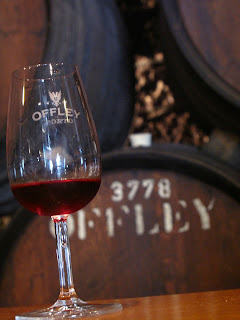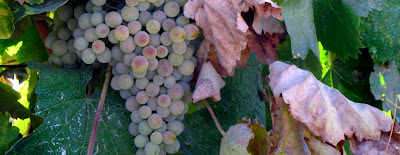Behind the brightly painted walls of Porto are the dark, musty Port caves. There are some 35 companies with their stores underground along the Duoro River in Vila Nova de Gaia. It as much a wine industry as a tourist industry. The hillside is dotted by giant logos looming above their respective factories.
For the production of Port, a fortified wine, crushed grapes are fermented for about two days. Then the fermentation is halted by the addition of a neutral distilled spirit or brandy. This raises the alcohol level and retains some of the grapes’ natural sugar. The Porto connection to port wine came about during the 1700s because Porto was the port where the fortified wine was shipped from. In fact the wine is made up in the Duoro valley, further inland, and then was floated down the river in barges, where it is processed and stored in barrels in the "caves" until ready to be exported.

 The caves are dank, and smell of musty cork and oak. Chalk scribblings mark the barrels and the vats, indicating color, age and amounts. Some of the company tours where more extravagant, with a costumed guide dressed like the brands logo, while others where more simple, leaving me one on one with the barrels stacked to the ceiling. After wandering through the dim, twisting rows, you are greeted by a sampling, a ruby, a tawny, and a white port. The liquid is heady to smell, with a sweet yet complex taste, leaving a smooth, mellow aftertaste.
The caves are dank, and smell of musty cork and oak. Chalk scribblings mark the barrels and the vats, indicating color, age and amounts. Some of the company tours where more extravagant, with a costumed guide dressed like the brands logo, while others where more simple, leaving me one on one with the barrels stacked to the ceiling. After wandering through the dim, twisting rows, you are greeted by a sampling, a ruby, a tawny, and a white port. The liquid is heady to smell, with a sweet yet complex taste, leaving a smooth, mellow aftertaste.
 Though the grapes can be grown and fermented in other parts of the world, only the grapes produced in the Duoro region can be considered true port (like how true champagne can only come from the Champagne region of France). The region is demarcated by a distinct microclimate, sheltered from the winds of the Atlantic, with hot dry summers and cold winters, when the moisture follows the river inland. The other distinct feature is the steep schist hillsides, where, quintas, farms, cling on to almost vertical slopes dropping down to the river. There is archaeological evidence for wine making in the region dating from the end of the Western Roman Empire, during the 3rd and 4th centuries AD. Today the port industry stretches up and down the river, carving a place for the grapes, which are characterized by their small, dense fruit which produce concentrated and long-lasting flavors, suitable for long aging.
Though the grapes can be grown and fermented in other parts of the world, only the grapes produced in the Duoro region can be considered true port (like how true champagne can only come from the Champagne region of France). The region is demarcated by a distinct microclimate, sheltered from the winds of the Atlantic, with hot dry summers and cold winters, when the moisture follows the river inland. The other distinct feature is the steep schist hillsides, where, quintas, farms, cling on to almost vertical slopes dropping down to the river. There is archaeological evidence for wine making in the region dating from the end of the Western Roman Empire, during the 3rd and 4th centuries AD. Today the port industry stretches up and down the river, carving a place for the grapes, which are characterized by their small, dense fruit which produce concentrated and long-lasting flavors, suitable for long aging. I found this interesting quote from a 19th century Englishman, "Portugal in itself, poor, yet climatically highly endowed, is capable of producing a variety of the most beautiful grapes, and a variety of wines, which, if properly made, would not be surpassed by those of any other country. The people are good-natured, industrious, and hard-working," by J.L.W. Thudichum, 1983.


No comments:
Post a Comment